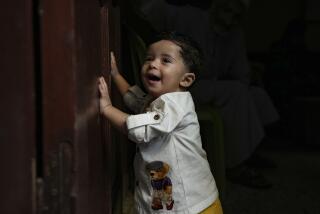Palestinian says women’s rights forgotten in Gaza
Reporting from Ramallah, West Bank — Naila Ayesh’s path to becoming a Muslim activist for women’s rights began when she miscarried in an Israeli detention center in 1987 after being arrested for belonging to a Palestinian student union.
Today Ayesh, 49, founder of the Gaza Strip-based Women’s Affairs Center, has become one of the only feminist voices in the seaside territory that was seized three years ago by Hamas, an armed Palestinian group that aspires to impose Islamic law.
Besides being married to Jamal Zakout, a top advisor to Prime Minister Salam Fayyad of the Fatah-led Palestinian Authority — Hamas’ political rival that rules the West Bank — Ayesh also raises eyebrows in Gaza as she moves in public without covering her head and sometimes even partakes of a shisha water pipe.
Speaking to The Times during a trip to Ramallah, Ayesh said women’s rights had been forgotten amid Gaza’s political and economic upheaval.
Q: Can you be a feminist in Gaza today?
A: We try. Things in Gaza now are not like before, when there were some openings to express different ideas and to have more freedom. Hamas controls everything, and they know everything that is going on. The situation in Gaza may look normal, but it’s not the real picture. Now, even speaking to journalists makes us a little afraid.
Q: What has been Hamas’ approach toward women’s issues since it took over three years ago?
A: The social agenda was always very important to Hamas, but they have not been very public or formal about [imposing] it. There is no official statement, for example, that women must cover their heads. But people know that’s what Hamas wants. So I can walk freely on the streets, like this, without a cover. But often I use taxis whenever I can.
Covering is not something that is new, by the way. Since the first intifada [in 1987-1993], Hamas has pushed women to cover because they said they didn’t want Israeli soldiers to see Palestinian women without cover. So even back then, women who didn’t believe in it started covering. I was threatened several times by people saying they would throw acid at me if I didn’t cover. Gaza society has always been perceived as a little more traditional and conservative, even before Hamas took over.
Q: But haven’t we seen cases recently of uncovered women being harassed at the beach, being banned from riding motorcycles, female attorneys having to cover in courtrooms and men being prohibited from working in beauty salons? Hamas recently even put up posters in which a woman wearing pants is labeled “satanic.”
A: These are individual cases, to tell the truth. It’s not a widespread phenomenon. Hamas doesn’t want to raise this issue in the society right now because they know they will lose. They are very eager to have good relations with Europe and the West. So they don’t want to touch this issue.
But sometimes they will put their ideas out there. For example, they will push elementary school girls to cover their head. Then, after women’s rights groups voice concerns, they back off. So it’s not an official decision, really. They put things out there, and then ease off.
But the result is the same. Even if people don’t really believe in the agenda of Hamas, they comply. They get the message without being forced. So even though women are not technically required to cover their heads in court, female judges are now doing it.
Q: Violence against women in Gaza is rising. In one recent study, 52% of women reported physical violence and 14% said they were victims of sexual violence. Honor killings are also rising. What’s driving this?
A: In the current environment in Gaza, it’s not surprising to see an increase in violence, especially after three years of [Israeli-imposed border restrictions] and following the Israeli war on Gaza [in the winter of 2008-09]. Violence is related to poverty, which is at about 80%, according to a Palestinian Human Rights Center study in 2008. Unemployment rates have reached unprecedented levels. Unemployed men spend their time at home without doing anything, and they take all this pressure, frustration and despair out on their wives and children.
Gaza has very few entertainment venues, if at all. No cinemas, no clubs, no parks, and therefore mosques became the main place where people meet, socialize and even conduct activities such as collecting donations and so on. People do not go to mosques just for praying. And, of course, in the mosque they hear traditional views about the role of women. It’s a kind of brainwashing.
It’s not just the men. Women are also going more to the mosque. They didn’t go so much before. But now they go mainly to find support, such as money or food. Men might be able to prevent them from going to one of our workshops about raising awareness, but they can’t stop women from going to the mosque.
Q: What sort of effect has that had on women and on your work?
A: It’s made our work more difficult. Our purpose is to empower women’s status and involvement in the Palestinian society, through raising awareness and advocating for human rights and women’s rights. We focus on ordinary women from different backgrounds.
But now sometimes we encounter resistance from women, who are becoming more aware about religious matters, and when we discuss women’s rights they usually debate it from a religious point of view.
To give you an example, if we advocate that a man should have only one wife, women might debate that religion allows for four, and that the prophet had more than one wife. If we speak against underage marriage, women might note that one of the prophet’s wives is claimed to have been underage when he married her. Some will even defend violence [against women] in the household.
Q: It sounds as if women’s issues are not a priority to many in Gaza right now.
A: People are worried about the central needs. Ask people now about their priority, and they will say food and work. They don’t care about politics right now. A lot of other issues are more important to women now than women’s rights.
Q: How have women been affected by the economic collapse?
A: Women represent less than 11% of the working force in Gaza. Due to the failure of the political process to change their reality, and the very difficult economic situation and the increasing unemployment rate among men, women became responsible for providing for their families through seeking support from humanitarian agencies. This became the main purpose in their lives rather than their rights as women or political participation. Women are trying to find support wherever they can.
In our center, we try to find work for 250 women each year through our job-creation projects. But it’s a small number. It’s the responsibility of international donors and other aid groups to not just provide money and food, but work on the long-term development of the society.
Because of this deterioration in the socioeconomic situation, there have been some cases of women who provided sexual services for men in return for money. Even married women. Even young women. It’s not a lot of cases, but it’s there.
Even Hamas is concerned now. Before they opposed us when we tried to open a shelter for women. They thought it would encourage bad behavior of women. Now they have a number of cases in which it would be dangerous to send a woman back to her family [after a case of perceived sexual misconduct]. They can arrest the man, but what do you do with the woman? The family might kill her. Last year, there were more than 14 honor killings [in which male family members killed a female family member who was perceived as bringing shame to the family].
Q: What have been some of the biggest effects on women in Gaza during the last three years?
A: In cases where wives have lost their husbands in the conflict, we are seeing the husband’s brother marrying the widow. If the woman doesn’t agree, she is thrown out of the house and the children are taken. She’s just a piece of furniture.
There is another phenomenon now, which is the collective weddings. We think they are humiliating. Hamas is arranging for hundreds of men to marry at the same time, paying for the wedding and giving the men money to encourage them to marry widows. Thousands have been married like this, and who knows how many of these marriages will last?
Also, families have been divided by the political split between Hamas and Fatah. If a woman’s father is Fatah and she’s married someone from Hamas, the woman might be prevented from visiting her family.
Q: Are there any female leaders within Hamas?
A: Women are represented in Hamas as … members of the party. However, from our experience they have no influence and thus they are not decision-makers.
More to Read
Sign up for Essential California
The most important California stories and recommendations in your inbox every morning.
You may occasionally receive promotional content from the Los Angeles Times.










